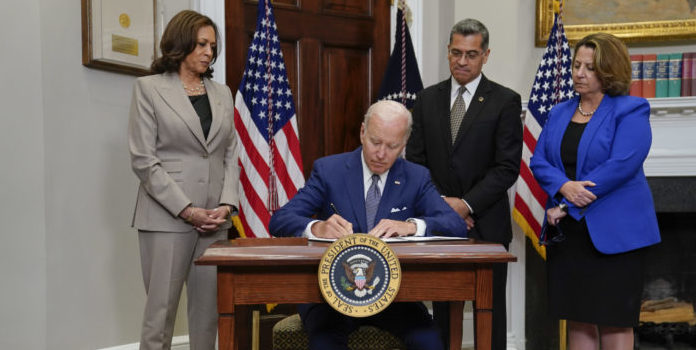(Headline USA) The Biden administration on Monday told hospitals that they “must” provide abortion services if the life of the mother is at risk, claiming federal law on emergency treatment guidelines preempts state laws in jurisdictions that now ban the procedure without any exceptions following the Supreme Court’s decision to end the federal abortion mandate.
Based on their own state laws, none of the states with abortion bans currently in effect would prevent the procedure in cases where the mother’s life was at risk, according to Breitbart.
However, the policy could put more power in the hands of the federal government to determine what constitutes a critical threat to the mother’s life and to define it in broader terms than would the state governments.
It also gives partisan leftists the opportunity to create new optical problems for red states that may seek to resist the federal overreach.
Already, left-wing activists and fake-news sites like the Daily Kos have pushed false information to suggest that some states might ban exceptions for the mother’s life, conflating it with those whose laws offer no exception for rape or incest.
Taken in tandem with Biden’s previously announced executive fiats on abortion, which also offered largely symbolic workarounds, the move signals clearly the unpopular president’s disdain for both the colateral judiciary branch and the sovereignty of individual states.
In issuing the directive, the administration appeared to be thumbing its nose at two of the court’s recent rulings:
- In Dobbs vs. Jackson Women’s Health, the court overturned the nearly 50-year-old abortion precedent first asserted under Roe V. Wade.
- The court also ruled in West Virginia v. EPA that federal agencies under purview of the executive branch have no authority to make laws without the consent of Congress.
As justification for the new policy, the Department of Health and Human Services cited requirements on medical facilities in the Emergency Medical Treatment and Labor Act, or EMTALA.
The law requires medical facilities to determine whether a person seeking treatment may be in labor or whether they face an emergency health situation—or one that could develop into an emergency—and to provide treatment.
“If a physician believes that a pregnant patient presenting at an emergency department is experiencing an emergency medical condition as defined by EMTALA, and that abortion is the stabilizing treatment necessary to resolve that condition, the physician must provide that treatment,” the agency’s guidance states.
“When a state law prohibits abortion and does not include an exception for the life of the pregnant person—or draws the exception more narrowly than EMTALA’s emergency medical condition definition—that state law is preempted.”
The department said emergency conditions include “ectopic pregnancy, complications of pregnancy loss, or emergent hypertensive disorders, such as preeclampsia with severe features.”
In a letter to health care providers, HHS Secretary Xavier Becerra wrote, “It is critical that providers know that a physician or other qualified medical personnel’s professional and legal duty to provide stabilizing medical treatment to a patient who presents to the emergency department and is found to have an emergency medical condition preempts any directly conflicting state law or mandate that might otherwise prohibit such treatment.”
The department claimed its guidance doesn’t reflect new policy, but merely reminds doctors and providers of their existing obligations under federal law.
“Under federal law, providers in emergency situations are required to provide stabilizing care to someone with an emergency medical condition, including abortion care if necessary, regardless of the state where they live,” said Centers for Medicare & Medicaid Services Administrator Chiquita Brooks–LaSure. “CMS will do everything within our authority to ensure that patients get the care they need.”
Mississippi’s trigger law, which went into effect Thursday, says abortion will be legal only if the woman’s life is in danger or if a pregnancy is caused by a rape reported to law enforcement. It does not have an exception for pregnancies caused by incest.
When asked about the Biden administration’s new guidance, Michelle Williams, chief of staff to Mississippi Attorney General Lynn Fitch, pointed to the existing exception in Mississippi’s abortion law.
“Mississippi’s law already makes an exception for preservation of the mother’s life,” Williams told The Associated Press on Monday. “The Biden Administration’s statement of existing law today is about nothing more than maintaining the false narrative that women’s lives are in danger in order to appease his base.”
Adapted from reporting by the Associated Press

